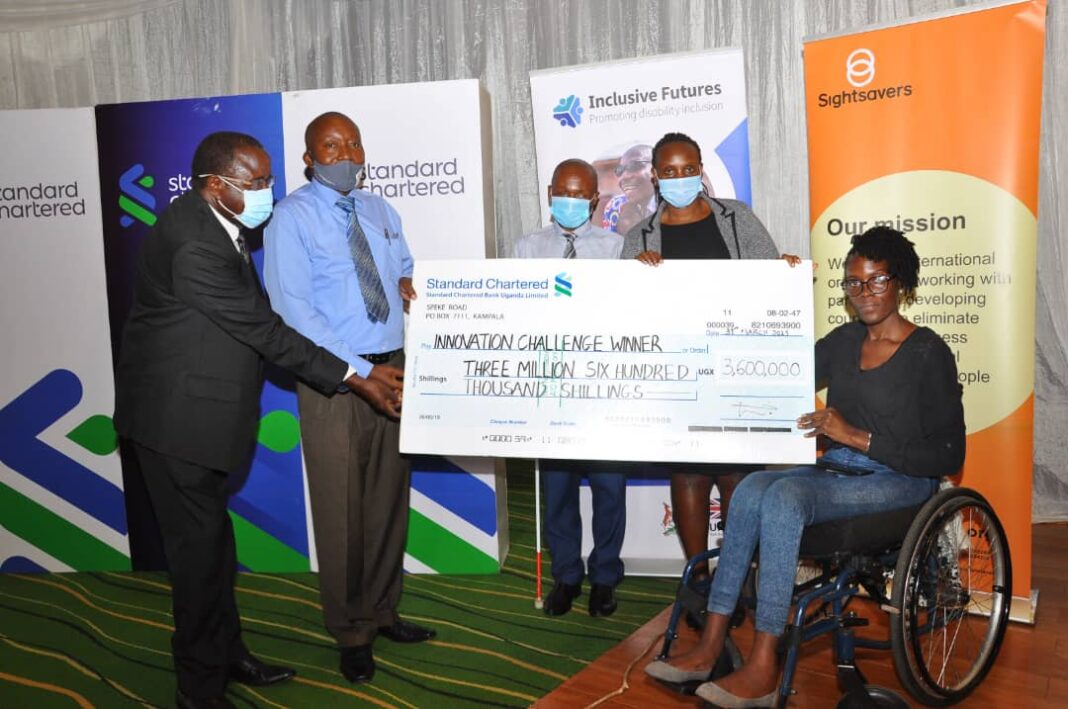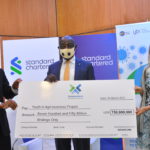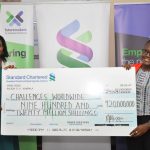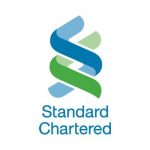Standard Chartered Bank Uganda in partnership with the Inclusion Works Consortium rewarded finalists of the ‘Innovation Challenge for Youth with Disabilities’ with Shs 18 million (USD 5,000) to help them realise their entrepreneurial aspirations.
This ‘innovation challenge’ initiative is part of the Bank’s Diversity and Inclusion agenda initiated as a means to empower youth with disabilities as job creators through self-motivated innovations. The Inclusion Works consortium led by Sightsavers announced the five winners of the ‘innovation challenge for youth with disabilities and the five included; two deaf youth, two visually impaired youth and 1 with physical body limitation with each of them receiving Shs 3.6 million.
Standard Chartered Bank and Sightsavers launched the ‘innovation challenge’ in December 2020, attracting a total of 32 applicants. On 3rd December, the 11 shortlisted applicants pitched their ideas to a panel of judges who then selected the five applicants. These have since then been undergoing a mentorship programme where they received sufficient business skills from experienced business mentors and online resources.
Speaking to the participants, the Commissioner for Disability and Elderly Affairs, Ministry of Gender, Labor and Social Development, Mr. Emilly Ajjambo thanked Standard Chartered and the Inclusion Works Consortium for complimenting government efforts.
“It’s only through a combined effort that we can address the needs of persons with disabilities. Government alone remains constrained due to inadequate resources yet the number of persons with disabilities who need support is still high.” he said
the Head of Corporate Affairs, Brand and Marketing, at Standard Chartered Bank Ms. Regina Mukiri said that the initiative is a move to recognize the hidden abilities of persons with disabilities, saying;
“Most often persons with disabilities face prejudice from society which rarely considers their potential. At Standard Chartered, we aspire to be a disability confident organization. We are committed to investing in youth with disabilities to help them prosper in addition to ensuring that we remain the best place to bank and work.” she said
Simon Brown, Global Technical Lead, Economic Empowerment, Sightsavers, while delivering his remarks, commented; “It’s clear that in the next economic recovery cycle from COVID-19, labor markets will even be more competitive than perhaps ever before; with many people competing for a relatively limited number of opportunities. That of course will change over the course of the cycle as resilient businesses fully recover and new business models emerge which generate employment. But an important moment to be investing in potential job creators as well as job seekers, and that’s exactly what Standard Chartered Bank is recognizing with this pilot of the Innovations Challenge. It’s been a terrific experience over the last few months, and it’s helped me see the potential this has to scale; of challenging youth with disabilities to generate entrepreneurial solutions that solve community needs, and then to launch those as a business. I very much look forward to seeing this model grow, because it is so consistent with the world’s ambition of building back better and more inclusively”.
The Sightsavers Uganda Country Director, Dr. Johnson Ngorok, appealed to the bank to scale up the intervention given the potential impact, adding;
“We enjoyed a decade of Standard Chartered’s seeing is Believing initiative where we collaborated helping many Ugandans to have their sight restored. We are now glad to once again collaborate with the bank in the ‘innovation challenge’ which builds onto the legacy of seeing is Believing. I believe this initiative will go a long way in improving the welfare of persons with disabilities as well as the realization of their human rights when they are economically empowered.”







